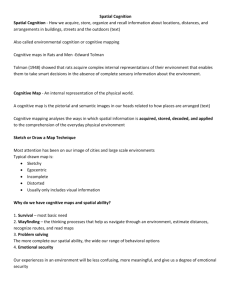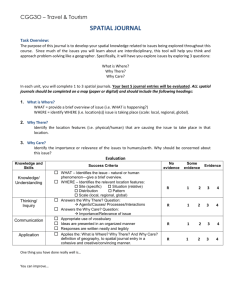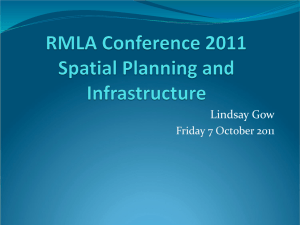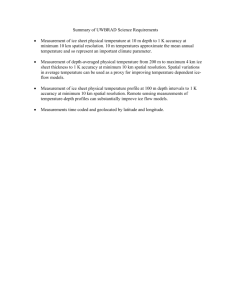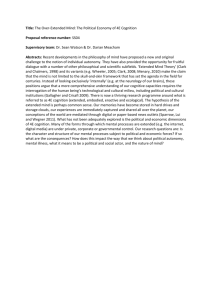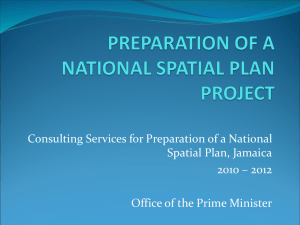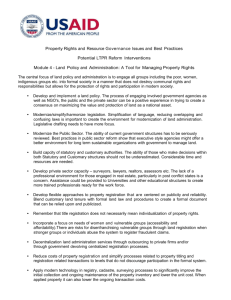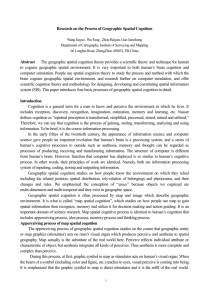Spatial Cognition and Computation
advertisement
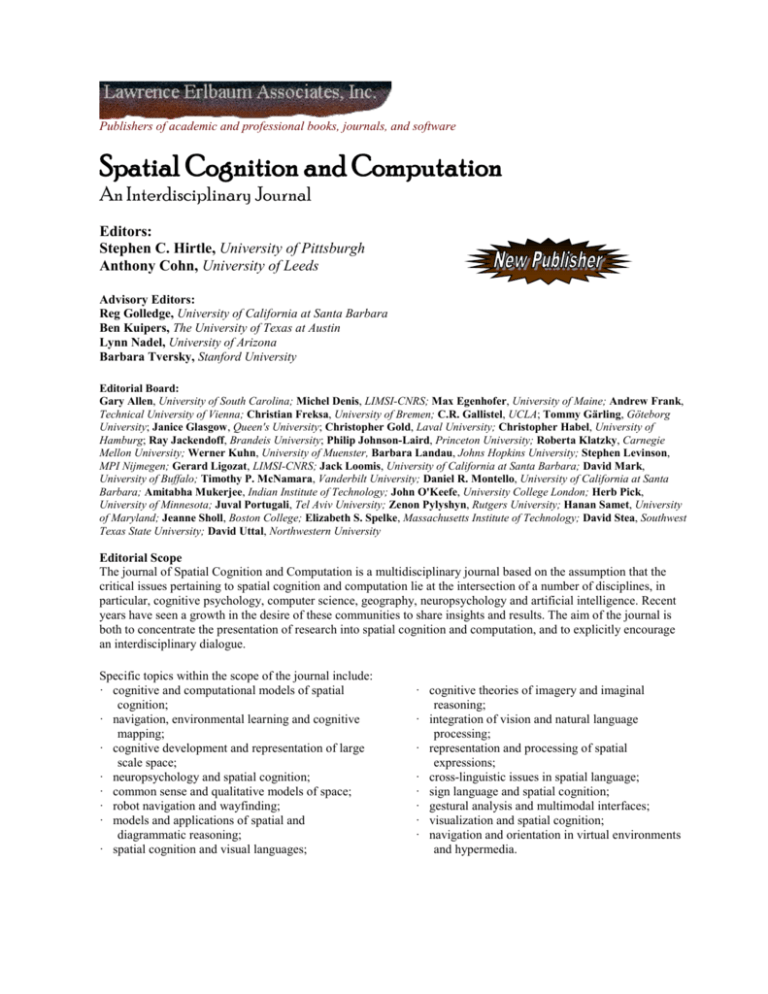
Publishers of academic and professional books, journals, and software Spatial Cognition and Computation An Interdisciplinary Journal Editors: Stephen C. Hirtle, University of Pittsburgh Anthony Cohn, University of Leeds Advisory Editors: Reg Golledge, University of California at Santa Barbara Ben Kuipers, The University of Texas at Austin Lynn Nadel, University of Arizona Barbara Tversky, Stanford University Editorial Board: Gary Allen, University of South Carolina; Michel Denis, LIMSI-CNRS; Max Egenhofer, University of Maine; Andrew Frank, Technical University of Vienna; Christian Freksa, University of Bremen; C.R. Gallistel, UCLA; Tommy Gärling, Göteborg University; Janice Glasgow, Queen's University; Christopher Gold, Laval University; Christopher Habel, University of Hamburg; Ray Jackendoff, Brandeis University; Philip Johnson-Laird, Princeton University; Roberta Klatzky, Carnegie Mellon University; Werner Kuhn, University of Muenster, Barbara Landau, Johns Hopkins University; Stephen Levinson, MPI Nijmegen; Gerard Ligozat, LIMSI-CNRS; Jack Loomis, University of California at Santa Barbara; David Mark, University of Buffalo; Timothy P. McNamara, Vanderbilt University; Daniel R. Montello, University of California at Santa Barbara; Amitabha Mukerjee, Indian Institute of Technology; John O'Keefe, University College London; Herb Pick, University of Minnesota; Juval Portugali, Tel Aviv University; Zenon Pylyshyn, Rutgers University; Hanan Samet, University of Maryland; Jeanne Sholl, Boston College; Elizabeth S. Spelke, Massachusetts Institute of Technology; David Stea, Southwest Texas State University; David Uttal, Northwestern University Editorial Scope The journal of Spatial Cognition and Computation is a multidisciplinary journal based on the assumption that the critical issues pertaining to spatial cognition and computation lie at the intersection of a number of disciplines, in particular, cognitive psychology, computer science, geography, neuropsychology and artificial intelligence. Recent years have seen a growth in the desire of these communities to share insights and results. The aim of the journal is both to concentrate the presentation of research into spatial cognition and computation, and to explicitly encourage an interdisciplinary dialogue. Specific topics within the scope of the journal include: · cognitive and computational models of spatial cognition; · navigation, environmental learning and cognitive mapping; · cognitive development and representation of large scale space; · neuropsychology and spatial cognition; · common sense and qualitative models of space; · robot navigation and wayfinding; · models and applications of spatial and diagrammatic reasoning; · spatial cognition and visual languages; · cognitive theories of imagery and imaginal reasoning; · integration of vision and natural language processing; · representation and processing of spatial expressions; · cross-linguistic issues in spatial language; · sign language and spatial cognition; · gestural analysis and multimodal interfaces; · visualization and spatial cognition; · navigation and orientation in virtual environments and hypermedia. Audience Psychologists, computer scientists, geographers, neuroscientists, linguists and professionals interested in the spatial sciences. Instructions to Contributors The journal encourages the submission of articles on any topic on spatial cognition and spatial computation. Due to the range of academic disciplines, problems to be addressed by the research should be of a general interest and authors are encouraged to present their ideas in a manner that is accessible to the entire journal readership. Research articles, empirical studies, integrative reviews of the literature and shorter opinion pieces will be considered for publication. Proposals for single-topic issues will also be considered. Submission. Any readable manuscript format is acceptable for initial submission and reviewing, although PDF is the preferred format, as manuscripts will be sent to reviewers in electronic form. Manuscripts should conform to the guidelines presented in the Publication Manual of the American Psychological Association (5th ed.). See the SCC Web site at http://www.sis.pitt.edu/~scc for style guidelines and a manuscript template. We will follow the APA policy that authors not submit a manuscript to more than one source at the same time. Authors should state in a cover letter that the manuscript is not under consideration for publication elsewhere; similarly, we will not accept a manuscript that has appeared (or that will appear) in any other source in whole or substantial part. Manuscripts should be sent in electronic form to the journal editors at scc@mail.sis.pitt.edu. The mailing address for the journal is Spatial Cognition and Computation School of Information Sciences, 7th Floor University of Pittsburgh Pittsburgh, PA 15260 USA Phone: +1 412-624-9434 Fax: +1 412-624-2788 Journal Subscriptions are available from Lawrence Erlbaum Associates, Inc. See http://www.erlbaum.com/ Journals/journals.htm for details. The journal was previously published by Kluwer Academic Publishers. For further information, please visit http://www.sis.pitt.edu/~scc
